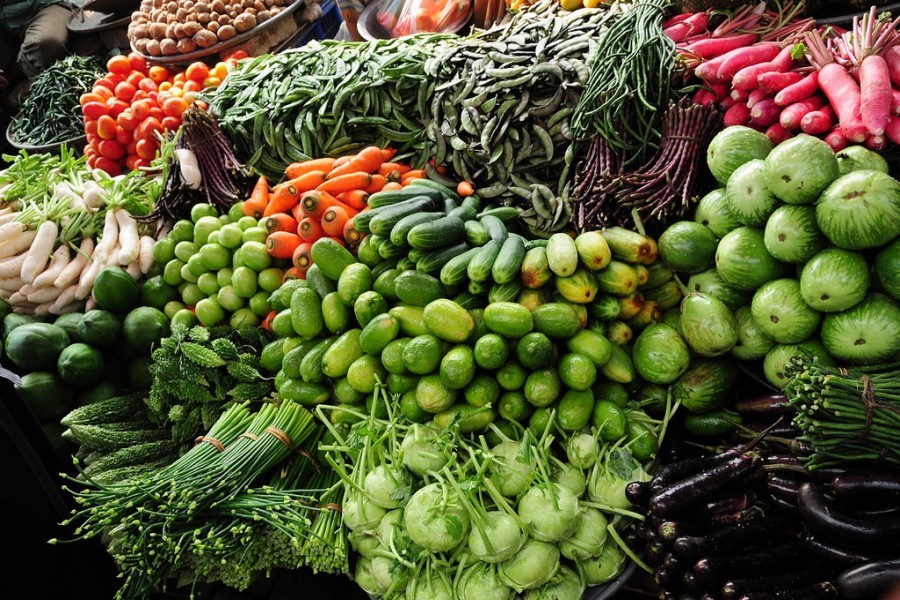Increase in export of agricultural produces and products -- primary and processed - in the just concluded fiscal year is an accomplishment that the country's agro-product exporters have reasons to cheer about. The government, too, can claim its share in this feat. It's a tribute the relevant authorities have earned by pursuing a policy of strict compliance in exporting agro products to major markets.
The country received all-time high earnings from export of agricultural product in the last fiscal. It fetched $909 million, 35 per cent up from that of FY '18, by exporting vegetables, betel leaf, tea, dry food, tobacco, fruits, and foliage. According to the Export Promotion Bureau (EPB), earnings from primary agricultural produce in FY '19 are 28 per cent higher than the $711-million export target set for the year. Dry and other processed agro items fetched 77 per cent or $700 million of the total earnings. Vegetables experienced a commendable performance by pulling in $100 million followed by tobacco $63 million and spices $42 million.
Concerned quarters have attributed this to considerable development in the country's compliance regime. It may be recalled that for decades export of agro products from the country was mostly reliant on the demand and consumption pattern of expatriate Bangladeshis, especially in the Middle East, gulf countries, the UK and North America. Exports, too, took place in smaller volumes to parts of South Asia. The practice of exporting, for the most part, was not subject to quarantine and phyto-sanitary standards of the importing countries. Export products were largely undiversified, and there was no organised attempt to either diversify products or significantly increase the volume of exports. This was mainly because of the looming threat of quarantine requirements in the destination markets, and in the absence of facilities in the country to comply with a host of such requirements, exporters did not brave the uncertainty of marketing their products in larger volumes. However, it did not take long for the threats to become real causing serious blockade to export. The problem began to be felt starkly since 2012 when importing countries, particularly those belonging to the EU, began to be rigid on compliance issues. A good number of vegetable consignments got held up at various EU ports. The key reason that halted most of these shipments related to the failure of sanitary and phyto-sanitary compliance - the foremost precondition for eatables to qualify for entry into European markets. Reports say, shipments were also turned down due to visible presence of pests. According to the EU Food and Veterinary Office report, a total of nearly 150 export consignments from Bangladesh were rejected in the past few years at various EU ports.
Subsequently, in 2014, the EU came down really strongly, imposing temporary ban on a number of Bangladeshi agro products. It was then that the authorities here, too, resorted to strict regulatory measures to ensure that farm produces and products, among others, are subjected to compliance needs of the importing countries. The authorities also went for self-imposed ban on a number of vegetable products for fear that these might also get into the EU ban list. The self-imposed ban continued for two and a half years taking a heavy toll on exports as shipments fell for three consecutive years. But it was meant to be beneficial for export in the long run, and it did so happen. To ensure export shipments free of pests and able to fulfil sanitary and phyto-sanitary requirements, the authorities made it mandatory for exporters to collect produce from farmers who have adopted good agricultural practice (GAP), hazard analysis and critical control points (HACCP), traceability and maximum residue limit (MRL). In addition, it was also made mandatory to collect produce from contract growers under the supervision of upazila agriculture officers.
It is these initiatives that have paid off. The good thing about the entire exercise is that the authorities not only understood the implications of noncompliant export shipments, but also took tough measures to ensure compliance-- though initially at the expense of falling exports.
Clearly, to be able to access and retain markets overseas, there is no shortcut to compliance. This is more so in case of agro products because of the different methods of growing and processing, some of which may be injurious to health. However, to continue educating the exporters about GAP and contract farming, it is important that the authorities keep providing necessary help and support, including technical knowledge.
Now that the export regime of agricultural products has entered a new phase by fulfilling compliance requirements of destination markets, one has reasons to expect that the country would be able make the most of its potential for accessing overseas markets.


